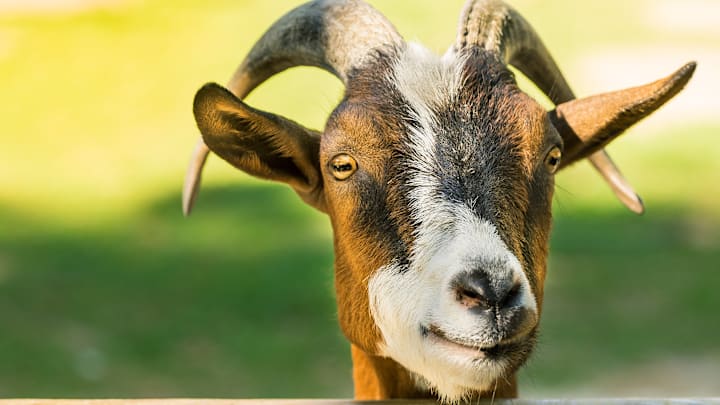From Marie Antoinette to the cow that reportedly caused the Great Chicago Fire of 1871, history is filled with figures who were single-handedly—yet often undeservedly—held responsible for epic societal failures or misdeeds. In other words, they became scapegoats. But what did goats (who are actually pretty awesome creatures) do to deserve association with this blameworthy bunch?
The word scapegoat was first coined by English Protestant scholar William Tyndale in his 1530 English translation of the Pentateuch, according to David Dawson’s 2013 book Flesh Becomes Word: A Lexicography of the Scapegoat Or, the History of an Idea. Tyndale, who was deciphering Hebrew descriptions of Yom Kippur rituals from the Book of Leviticus, recounted a ceremony in which one of two goats was selected by lot. A high priest would place his hands on the goat’s head and confess his people's sins—thus transferring them to the animal—before casting it out into the wilderness to rid Israel of its transgressions. As for the other goat, it would be sacrificed to the Lord.
Tyndale coined the word scapegoat to describe the sin-bearing creature, interpreting the Hebrew word azazel or Azazel as ez ozel, or “the goat that departs or escapes.” That said, some scholars have disagreed with his interpretation, claiming that Azazel actually stands for the name of a goat-like wilderness demon, whom the offering was meant for, or a specific location in the desert to where sins were banished, often thought to be a mountainous cliff from which the scapegoat was cast off and killed.
Over the centuries, the word scapegoat became disassociated with its biblical meaning, and it eventually became used as a metaphor to describe a person who shoulders the blame of any wrongdoing. Now that you know the word’s etymology, remember the poor animals that inspired it, and maybe resolve to go a little easier on the next person who ends up having to take the fall for everyone else’s mistakes.
A version of this story ran in 2017; it has been updated for 2023.
Are you a logophile? Do you want to learn unusual words and old-timey slang to make conversation more interesting, or discover fascinating tidbits about the origins of everyday phrases? Then get our new book, The Curious Compendium of Wonderful Words: A Miscellany of Obscure Terms, Bizarre Phrases, & Surprising Etymologies, out now! You can pick up your copy on Amazon, Barnes & Noble, Books-A-Million, or Bookshop.org.
